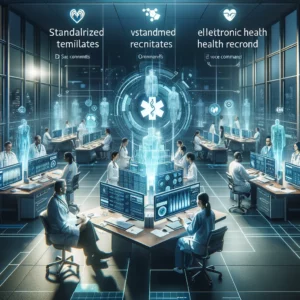Let’s delve into how advanced technologies like AI, NLP, and blockchain are pivotal in tackling the healthcare industry’s staffing challenges. Highlighting the importance of innovation, this article explores how these technologies not only streamline processes but also enhance the quality and security of medical record management. It underscores the transformative potential of integrating new systems, emphasizing efficiency, patient care improvement, and the empowered role of medical staff in this evolving landscape.
Innovation to the Rescue
In the realm of healthcare, innovation serves as a beacon of progress, with technologies like Artificial Intelligence (AI), Natural Language Processing (NLP), and blockchain leading the charge towards more efficient, secure, and insightful medical record management. AI and NLP work hand in hand to automate the tedious tasks of data entry and coding, while also extracting meaningful insights from the vast amounts of unstructured data contained in medical notes. This synergy not only streamlines administrative processes but also enhances the accuracy of patient records, supporting better clinical decisions.
Meanwhile, blockchain technology introduces a new level of security and integrity to medical records. By creating a decentralized and tamper-proof ledger for storing patient data, blockchain ensures that medical records are secure, private, and immutable. This innovation addresses major concerns around data breaches and privacy violations, building a foundation of trust and reliability in the digital management of health information. Together, these technological advancements are setting a new standard for the healthcare industry, promising a future where medical record management is more accurate, efficient, and secure.
Efficiency for Streamlining Processes

Innovations aimed at streamlining healthcare processes are transforming efficiency and accuracy in patient care. The implementation of standardized templates for essential documentation like progress notes and discharge summaries ensures uniformity and clarity across medical records. Furthermore, the adoption of voice recognition software facilitates quicker dictation and transcription, significantly reducing the administrative burden on healthcare professionals. Additionally, the integration of Electronic Health Record (EHR) systems with other healthcare platforms promotes a cohesive healthcare ecosystem, enhancing data accessibility and interoperability. These advancements collectively foster a more efficient and responsive healthcare environment.
The drive towards operational excellence in healthcare continues with further enhancements in process streamlining through technology. Beyond the use of standardized templates and voice recognition, the integration of EHR systems with other platforms enables a seamless flow of information across the healthcare continuum. This not only streamlines clinical and administrative processes but also plays a pivotal role in the realization of a fully integrated health system. By facilitating real-time access to patient data and reducing redundant tasks, healthcare providers can focus more on patient care and less on paperwork, leading to improved outcomes and patient satisfaction.
The Empowered Staff
Empowering staff in the healthcare sector by reducing their administrative burdens allows them more time to focus on complex tasks and patient interaction, thereby significantly enhancing job satisfaction. This shift not only improves the quality of care but also motivates staff to engage more deeply with their work. Additionally, with fewer administrative tasks, healthcare professionals can dedicate more attention to data analysis and quality improvement initiatives, leading to more efficient operations and better patient outcomes. This empowerment of staff is a key driver in the evolution of healthcare services, fostering a more engaged, satisfied, and productive workforce.
By focusing more on high-value tasks and direct patient care, staff in the healthcare environment are not only more empowered but also better positioned to contribute to quality improvement and patient outcomes. This empowerment leads to a virtuous cycle where reduced administrative tasks elevate job satisfaction, thereby attracting and retaining top talent. It enables healthcare professionals to utilize their skills more effectively, enhancing their ability to innovate and improve healthcare delivery, which in turn can lead to groundbreaking advancements in patient care and health management strategies.
Artificial Intelligence (AI) and Automation
Artificial Intelligence (AI) and automation are revolutionizing healthcare by streamlining tasks such as data extraction from patient charts and automating coding and billing processes. These technologies improve efficiency and accuracy, reducing the potential for human error. Additionally, AI-driven chatbots are being used to handle basic patient inquiries and schedule appointments, enhancing patient engagement and freeing up human resources for more complex tasks. This integration of AI and automation into healthcare workflows signifies a significant shift towards more efficient and patient-centered care.
Expanding the application of AI and automation in healthcare, these technologies are set to profoundly impact patient care and operational efficiency. Beyond automating routine tasks, they’re pivotal in analyzing vast datasets for predictive analytics, enhancing diagnostics, and personalized treatment plans. Chatbots and virtual assistants are extending their capabilities into patient education, post-treatment follow-up, and managing chronic conditions, promising a future where healthcare is more accessible, responsive, and tailored to individual patient needs.
Interoperability and Data Sharing
Interoperability and data sharing in healthcare are foundational for enhancing the efficiency and quality of patient care. By enabling the seamless exchange of medical records between providers, interoperability reduces the duplication of efforts and streamlines patient care coordination. This not only improves the accuracy of diagnoses and treatment plans but also significantly enhances patient outcomes by ensuring that all healthcare professionals involved in a patient’s care have access to the most up-to-date information. Furthermore, empowering patients to manage their own health information fosters a more active involvement in their healthcare journey, enhancing patient engagement and satisfaction. As the healthcare industry continues to evolve, the emphasis on interoperability and data sharing will play a crucial role in driving advancements in medical technology and patient care strategies.
Interoperability and data sharing in healthcare further enable a holistic approach to patient care, where healthcare decisions are informed by a comprehensive view of the patient’s history. This systemic connectivity reduces errors and redundant tests, leading to more efficient care delivery and cost reductions. Additionally, with the rise of digital health applications, patients gain unprecedented access and control over their health data, enabling better personal health management and decision-making. The future of healthcare lies in leveraging these technologies to create a more connected, efficient, and patient-centered care ecosystem.
The Human Touch: The Evolving Role of Medical Record Staff
As the healthcare landscape evolves, so does the role of medical record staff, shifting towards more specialized functions such as data analysis, quality control, and patient communication. This transition emphasizes the importance of a human touch in managing and interpreting healthcare data. Staff are increasingly tasked with ensuring the accuracy and completeness of medical records, a critical role in supporting healthcare providers’ decision-making processes. Moreover, their involvement in patient education about health information management highlights the growing intersection between healthcare delivery and information management, illustrating a dynamic field where technical expertise and patient interaction converge.
With the integration of advanced technologies in healthcare, the role of medical record staff is becoming more nuanced and impactful. As they pivot towards tasks requiring analytical thinking and meticulous attention to detail, such as data analysis and quality control, their work directly influences patient care quality and safety. This evolution also places them at the forefront of patient communication and education, guiding patients in understanding their health records and advocating for their own health. Their expertise ensures the integrity of health data, a cornerstone for effective treatment plans and health outcomes, highlighting the indispensable human element amidst digital transformation.
The Road Ahead: Challenges and Opportunities
As the healthcare sector ventures into the future, it faces challenges and opportunities in adopting new technologies. Upfront costs, data privacy, cybersecurity, and the necessity for staff training and workflow adaptation are significant hurdles. Yet, overcoming these challenges opens doors to enhanced efficiency, improved patient care, and better data management. Navigating this landscape requires a balanced approach, focusing on strategic investments, robust security protocols, and continuous education for healthcare professionals, thereby ensuring a smoother transition to a technologically advanced healthcare ecosystem.
Embracing new healthcare technologies is a journey paved with both obstacles and promise. Beyond the initial financial investment, there’s the intricate challenge of safeguarding data privacy and ensuring robust cybersecurity measures are in place. Moreover, the transition demands comprehensive staff training to adapt to new systems and workflows efficiently. These challenges, though formidable, offer a pathway to revolutionizing healthcare delivery, enhancing patient care, and streamlining operations, underlining the importance of strategic planning and commitment to innovation in navigating the road ahead.
FAQs
Related FAQs sourced from Google’s People Also Ask and forums
What are the causes of the medical record staffing shortage?
What are the consequences of the medical record staffing shortage?
How can the medical record staffing shortage be overcome?
What can technology assist in addressing the medical record staffing shortage?







